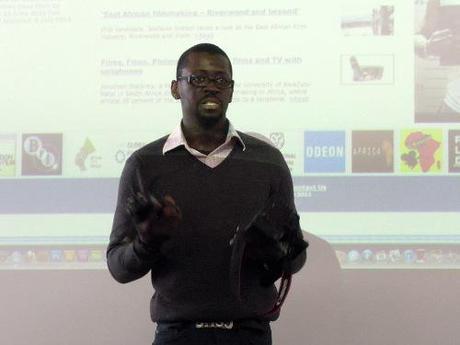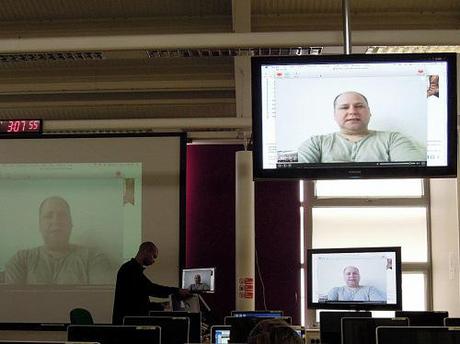Mobile media technology master Ilicco Elia, entrepreneurial journalist Don Omope and Mediastorm’s Brian Storm have agreed to talk to us about how and why their respective fields are changing, and their roles in that process.
Video journalist David Dunkley-Gyimah, our lecturer at the University of Westminster, has managed to pull some strings in the media world once again. After our chance to talk to the inspiring and award-winning director Eliot Rausch on Skype a couple of weeks back, this is our chance to broaden our horizons even further. The rapid growth of technological capability was resonant throughout all three our conversations, affecting the abilities of storytellers, journalists and even ordinary netizens.
Mobile technology
During his 20 years working for Thomson Reuters, Ilicco Elia was able to pioneer mobile services for the international news agency. He explains to us, while intermittently checking one of his six mobile phones, that mobile technology is no longer about how fast the internet or device is, but rather about how the consumer feels when using it. For the first time, smartphones such as the iPhone enable us to communicate with each other in ways that didn’t seem possible even as recent as 5 years ago. He smiles at the prospect of what mobile technology will evolve into in the coming 5 years.
Mobile technology has had a great impact on the practices of journalists too. Ilicco is reminisces of the first time he had encouraged a dis-believing colleague at Reuters, photographer Finbarr O’Reilly, to take a mobile phone with him into the field. But as the photographer and his camera equipment were battered by rebels in Chad, the mobile phone he had taken as backup suddenly became more useful than he had previously thought. Not only did the mobile phone provide the last resort backup, but it’s GPS function allowed him to be rescued.
For reporters, the mobile phone can facilitate a different kind of interview than a camera can. Many interviewees feel less intimidated by a mobile phone, and open up more in front of it. On top of this, as Ilicco elaborates, mobile phones allow journalists to film or photograph something, and send it directly back to the agency. Mobile technology therefore, doesn’t attempt to take away the role of the journalist, but to allow them more flexibility.
Taking control

Creative “Jack of all trades” Donald Omope has been making giant steps in the field of Entrepreneurial Journalism. Being able to photograph, shoot video, report, write and communicate well is impressive enough as it is. But knowing how to talk and interact with news agencies and broadcasting companies in way that they realize your worth, sets Don aside from the rest of us. He advises us that there are two ways to get to the top as a journalist. “You can start at the bottom of a company and slowly work your way up,” he says, “or you can build yourself up independently so that companies sought after you.” And that’s the approach he has taken.
And every step of the way, he has retained complete control over his life by making choices only for the benefit of his passions. During his undergraduate studies at the University of Westminster, he worked, saved up his student loan and even invested in stocks and shares in order to pay for his camera equipment.
During the 2011 riots in London, Don photographed the action in Tottenham. Don describes, that after arriving at the scene, it didn’t take him long as a local to suss out who was going to be the easier party to focus on, rioters or police. But it wasn’t that easy. At one point, he found a police baton crashing down on his head and camera, after repeated harassment to stop photographing them. But he knew his rights as a journalist. Later, as he spoke live to the BBC, he began to read out the badge number of the police officer who had attacked him, as he watched the color disappear from the officer’s face.
“If you don’t have an idea, then you’ve got no hope (in this industry),” he exlains to us. It is important to look for your own niche, in which there is currently something missing. Then when you have your idea, you must use all the skills you have to make that idea materialise.
The days when one could get by with one skill are long gone, and Don has shown that being self-sufficient financially and journalistically can bring you closer to your dreams. With his passion in Film and seeing a gap in the market for it, he set up a website called African Screens, the only online magazine focusing on the African Film Industry.
Storytelling that counts
 Brian Storm emphasises that storytelling itself has not changed over time, but changes in technology now mean that it is possible for anyone to tell a story and make it global. “It transcends all platforms, all devices…it’s still about telling stories.” The aim of award-winning multimedia production studio Mediastorm has been to tell stories that every human being can relate to, that get us thinking about what binds us as a people.
Brian Storm emphasises that storytelling itself has not changed over time, but changes in technology now mean that it is possible for anyone to tell a story and make it global. “It transcends all platforms, all devices…it’s still about telling stories.” The aim of award-winning multimedia production studio Mediastorm has been to tell stories that every human being can relate to, that get us thinking about what binds us as a people.
He takes us back to 1994 when he was at the University of Missouri School of Journalism. He had been working for a newspaper in Missouri as a stills photographer. But troubled by only being allowed 2 photos per story, he decided to create a platform that didn’t limit how a story is told – Mediastorm.
Besides its impressively high quality productions, what sets Mediastorm apart is most definitely its attitude. “Journalists go around pretending that they can be objective, but that’s impossible,” he says, “you can be fair to your subject, but you can’t be objective.” Preferring to call themselves storytellers, as opposed to journalists, the staff at Mediastorm, “don’t fit a traditional model, we fit what we care about.”
Some productions such as Walter Astrada’s ‘Undesired’, bringing light to the suffering of many Indian women as a consequence of gender inequality, have been criticised for being unbalanced. But Brian strongly upholds that their aim is to raise public awareness of these issues, and by provoking the emotions that it does, more people want to watch it.
He has a similar attitude to the Kony 2012 video, which has come under heavy fire recently. He applauds director Jason Russell for being able to get 30 billion people thinking about a topic they didn’t previously know about. Brian also surmises that critics of the video are simply envious that they weren’t able to do something with as much impact.
Three conclusions
After the day of talking to such inspirational characters, we walk away with many ideas buzzing around in our minds. Don empowers us by telling us that if we wish, we are able to control our own careers and stay close to our passions. Ilicco, by his example alone, shows us how much technology can develop in such a short space of time, making the lives of journalists incredibly flexible. And Brian Storm reminds us that although technology may be changing, the fundamental things that make us human remain the same.
